I like how your AARS have this Nationalist goal they are trying to achieve... It's very nice
Tunis Delenda Est
- Thread starter Selzro
- Start date
-
We have updated our Community Code of Conduct. Please read through the new rules for the forum that are an integral part of Paradox Interactive’s User Agreement.
You are using an out of date browser. It may not display this or other websites correctly.
You should upgrade or use an alternative browser.
You should upgrade or use an alternative browser.
Very nice! I guess those landless men had to join the army before you westernised! I'm curious where China sits in the powers list.. and you for that matter. Any chance of a look at the ledger? Did you NF for soldiers a bit in there or was that just from high military spending and a lack of jobs? Either way nicely done. I like the bit about the ancestral home.. Roleplayed conquest is nice  . Looking forward to the Tunisian industrial boom... man that sounds weird to say
. Looking forward to the Tunisian industrial boom... man that sounds weird to say  . I guess you aren't that close to the techs required for colonisation yet? Hopefully you can get in the game before its all gone. Good luck!!
. I guess you aren't that close to the techs required for colonisation yet? Hopefully you can get in the game before its all gone. Good luck!!
This rocks!
First US attacking Tripoli, then the confederates? Yikes!
You're seriously the best writer of AAR's that I've ever seen though, keep up the good work!
First US attacking Tripoli, then the confederates? Yikes!
You're seriously the best writer of AAR's that I've ever seen though, keep up the good work!
Thanks, I do like to roleplay my expansions, whenever they are not completely opportunistic.
Here's the ledger from July 26 1870 (almost two months before I westernized, but I've played ahead a bit and that's the closest save to the end of the last chapter):
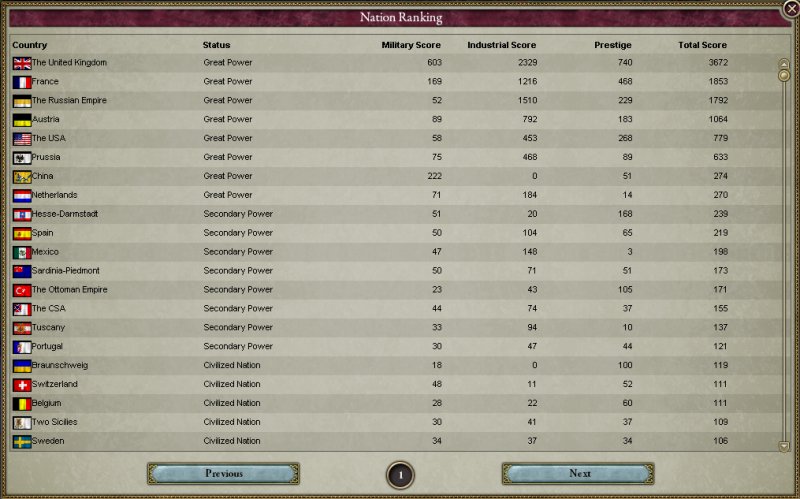
Tunis, at 24, would not appear on this list in any case. China, a year and 3 weeks after its westernization, sits at the 7th spot of great powers, having displaced Spain, which is now a secondary power. The CSA is doing well, for now, and Tuscany has snatched an SP position while former Tunisian enemies (Two Sicilies, Sweden) have fallen in rank.
I didn't use a NF for soldiers, just officers, but I had maintained full funding for them throughout the previous wars, so all I had to do was recruit more brigades and the POPs would increase gradually. Most of the score still came from officers, though. Unfortunately I'm as far from the necessary colonization techs as it gets, but I'm a patient man. Tunis will get there.
You flatter me, Leckan!
Here's the ledger from July 26 1870 (almost two months before I westernized, but I've played ahead a bit and that's the closest save to the end of the last chapter):

Tunis, at 24, would not appear on this list in any case. China, a year and 3 weeks after its westernization, sits at the 7th spot of great powers, having displaced Spain, which is now a secondary power. The CSA is doing well, for now, and Tuscany has snatched an SP position while former Tunisian enemies (Two Sicilies, Sweden) have fallen in rank.
I didn't use a NF for soldiers, just officers, but I had maintained full funding for them throughout the previous wars, so all I had to do was recruit more brigades and the POPs would increase gradually. Most of the score still came from officers, though. Unfortunately I'm as far from the necessary colonization techs as it gets, but I'm a patient man. Tunis will get there.
You flatter me, Leckan!
Wow, fantastic! As others have said, I never thought I'd see a Tunisia that survived, let alone westernised. Great job! I'll be eagerly watching to see what happens next.
yeah! you just have to become a secondary power before you have the required techs for colonization!
Yay the dutchies in the big league! I've never seen such an early westernised China. I can't wait to see how they end up. Hopefully little Tunis can knock Portugal out of the secondary nations. They have a nice position for colonising, but hardly ever seem to. Good luck as ever!
This is the first time I've seen China westernize so early a well - the only other time it happened in one of my games was in 1933 - a bit late to become significant, regrettably.
As for Tunis... economic survival in the industrial war is proving as difficult as survival in the world of flags and borders, as the next updates will show. At least, thanks to its rising population, getting the required score to be a secondary power will not take too long.
I will be leaving for a few days, and I don't know if I'll take the time to play Vic2 on my laptop, but I will return within the next week. Until then, I leave you with the next chapter and wishes for a merry Christmas!
As for Tunis... economic survival in the industrial war is proving as difficult as survival in the world of flags and borders, as the next updates will show. At least, thanks to its rising population, getting the required score to be a secondary power will not take too long.
I will be leaving for a few days, and I don't know if I'll take the time to play Vic2 on my laptop, but I will return within the next week. Until then, I leave you with the next chapter and wishes for a merry Christmas!
Chapter VII – Industrial Stress
Tunis arrived late at the industrialized world, and it would struggle to find a competitive niche in the world market. Until then, cement and glass factories were initiated in all three states by the government, since the conservative Royal Faction had been voted to power in 1869, and it espoused the economic doctrine of State Capitalism.
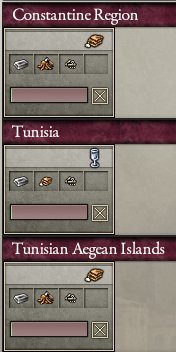
However, even they seemed to have trouble getting started. The glass factory was being constructed with little difficulty but would still not become operational for another year, but the cement factories required timber and that was in short supply in the world market. To deal with the rising number of jobless craftsmen, trinket subsidies and trinket pensions were enacted in 1871
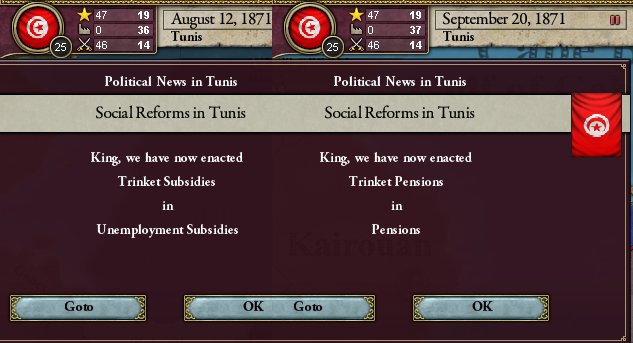
Militancy went down nation-wide, and would not grow again as easily as in the years before. As Tunis’ diplomatic status, as a civilized associate of France, grew, Switzerland and the Papal States offered alliances, which the Tunisian government accepted. There was still some ill feeling against Rome, but a war within France’s SOI was out of the question and closer relations with the Pope would allow Tunis better information on the affairs of Italy and perhaps a chance to meddle in them, eventually.
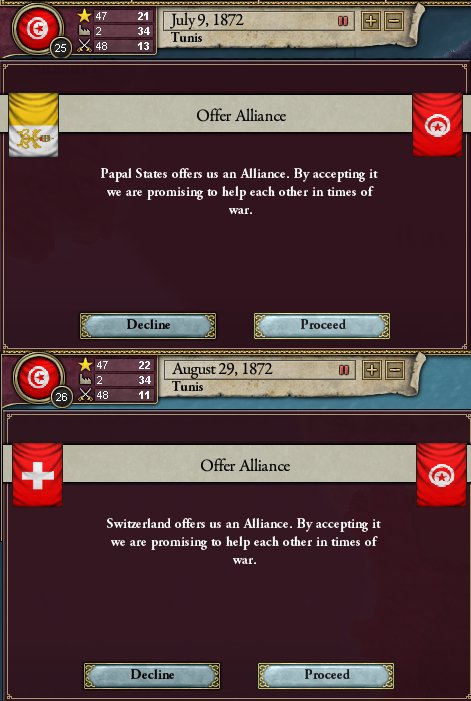
As the year went by and the world timber shortage continued unabated, the Tunisian government sought unconventional ways to get access to that resource. It was at that point that it was suggested in parliament that since Tunis was now counted as a civilized nation, it would befit it to act as one. Brunei had much unexploited timber and little in the way of defence. Though its distance would have made any thought of establishing a protectorate there illogical in the past, France had recently agreed to offer Tunis military access, so the former’s many ports in the Indian Ocean would make the endeavour possible.
So it was that in November 1872, a small fleet carrying an expeditionary force of two brigades arrived off the coast of Brunei, and a declaration of war was delivered.
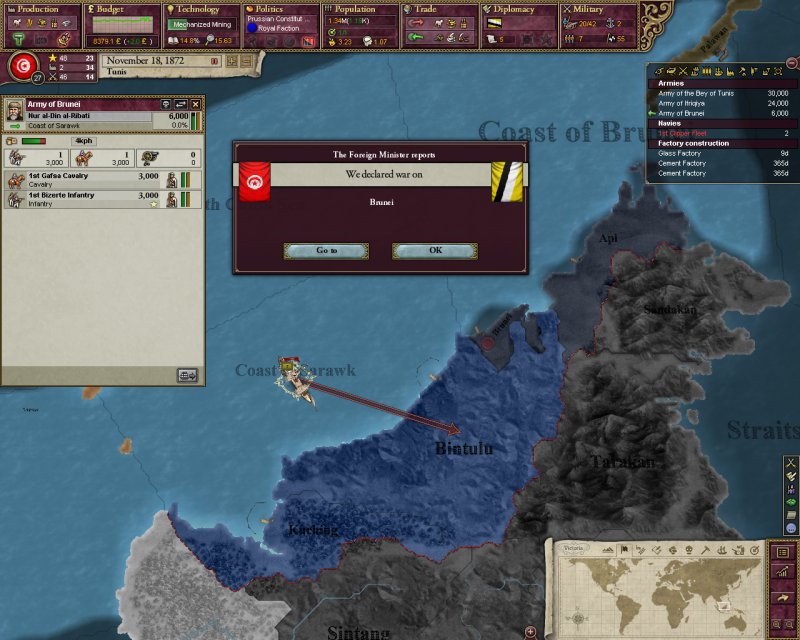
Resistance was meek, and after just over a year, in January 1874, Tunisian Brunei was formed.
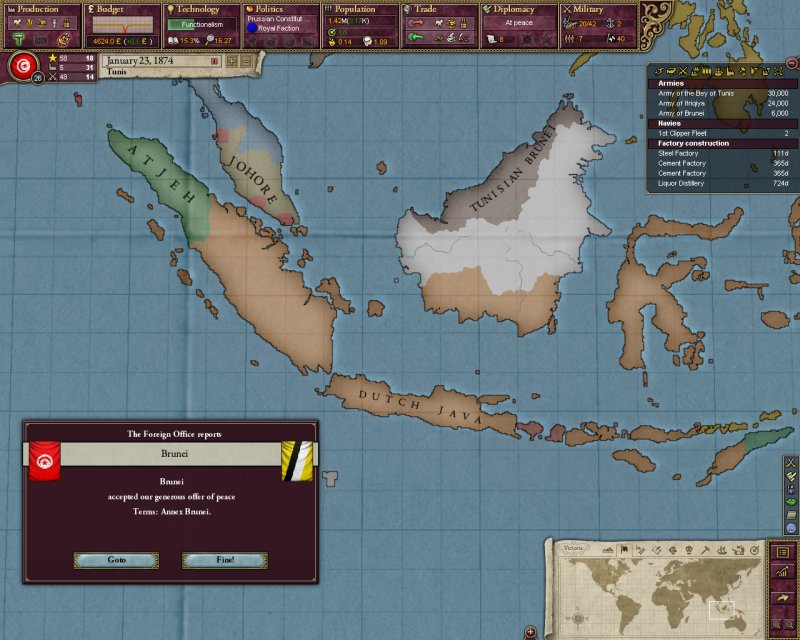
Though that expedition appealed to the Tunisian people’s sense of jingoism and national pride, it had no noticeable effect on Tunis’ industry, so it was technically a strategic failure. Long exposure to the Far East also introduced a new strain of flu to Tunisia, which claimed many lives before it was contained.
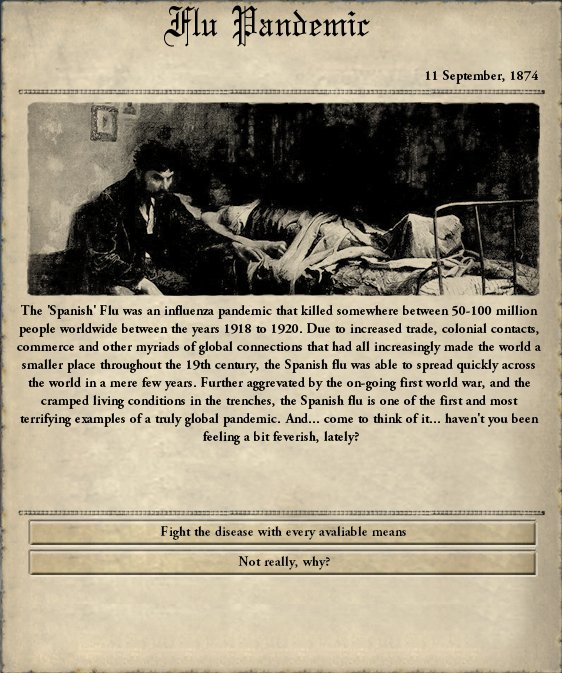
Some timber finally appeared in the market in 1877, and the cement factories began to be constructed. The glass factories in Tunis, though initially profitable, started losing money fast after much had been invested in expanding them. Likewise with a steel factory in Constantine, while an explosives factory in Crete was never profitable to begin with. Local capitalists initiated some new construction projects, but the outlook on their sustainability was not good.
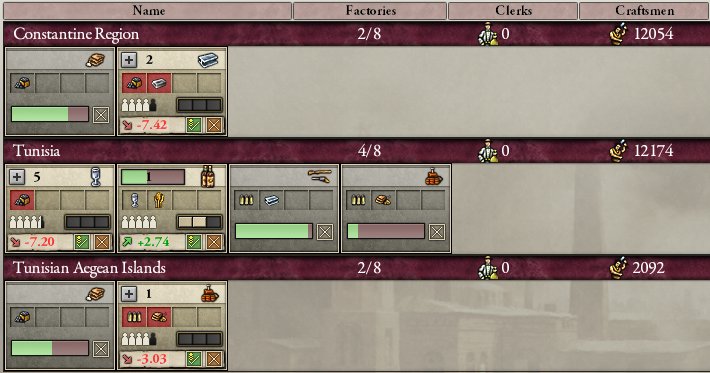
To keep the economy from imploding under the large industrial subsidies needed to keep the factories running, and also to avoid the complete ruin of Tunisian industry, a micromanaging policy of intermittent subsidies was enforced. Any factory costing close to 10 pounds per day or more would receive no funding from the state, until it had cut down on costs and laid off some workers. When it then struggled to stay afloat, it would receive subsidies again. That policy kept the country’s industry running while avoiding bankruptcy, but at the cost of increased job anxiety among the population and increased workload for the government.
Still, the nation moved on, and Darwinism was made popular in 1878, boosting the educational system significantly.
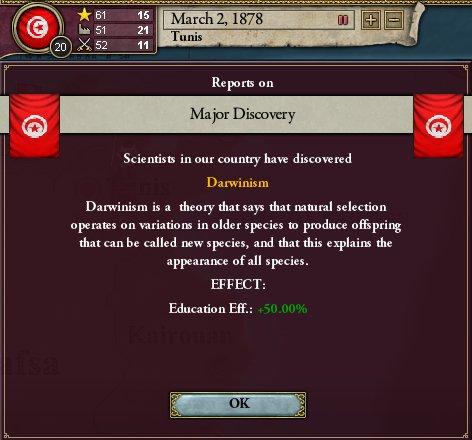
A year after that the Papal Stated agreed to give Tunis military access, while a year after that the United Kingdom hosted the Congo Conference. Tunis would have very much liked to attend, but it was still a poor country and could not afford the cost.
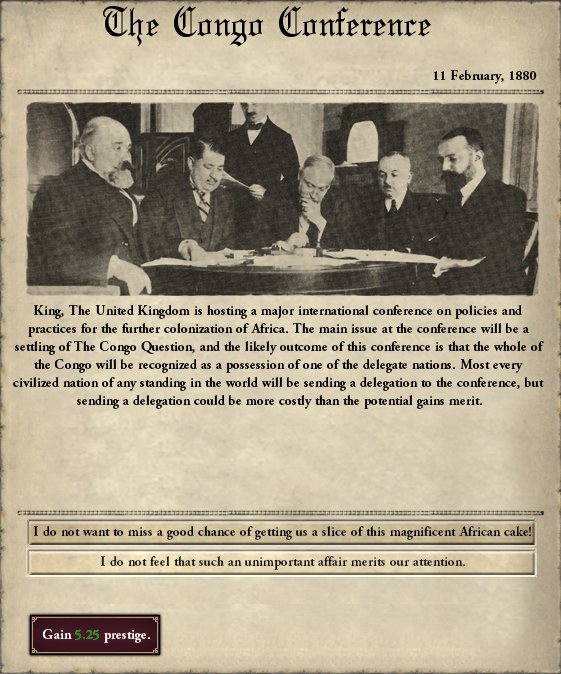
To make up for it, the Brunei Expeditionary Army was sent to Mogadishu, to wrest the town away from Oman. After pacifying the town, the army landed in Oman proper in December and made for its capital, so by April 1881 the Omanis had decided that further resistance was counter-productive and parted with their last African holding.
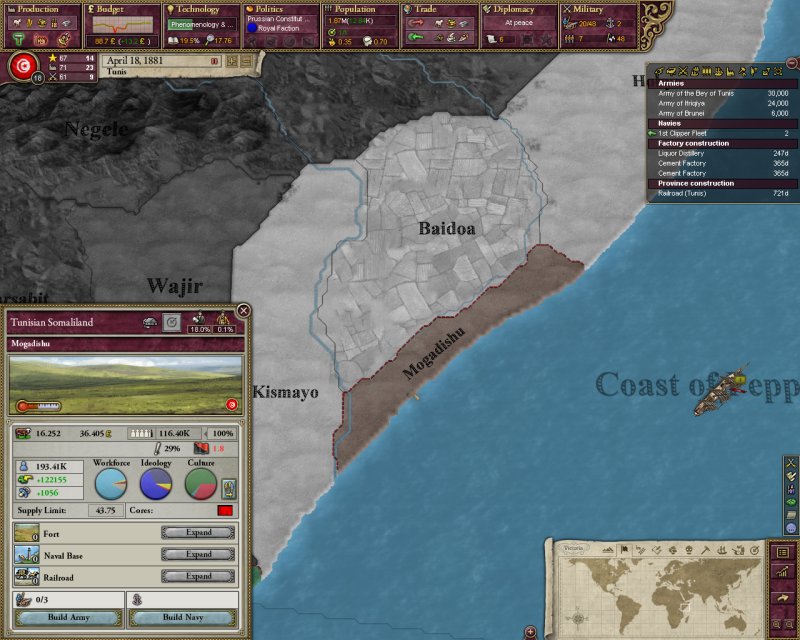
The new colony immediately experienced an influx of immigrants, which placed an extreme strain on its infrastructure. So it came as no big surprise when an outbreak of tuberculosis afflicted the population after just a few months.
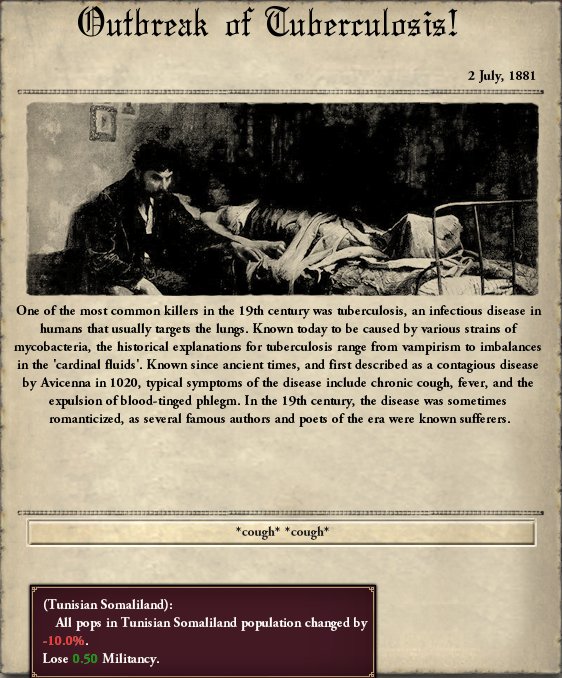
In 1882, Tunis’ increasing prestige and industry placed it among the secondary powers of the world. It may not have been a rich secondary power, but it had earned that position through blood and sweat.
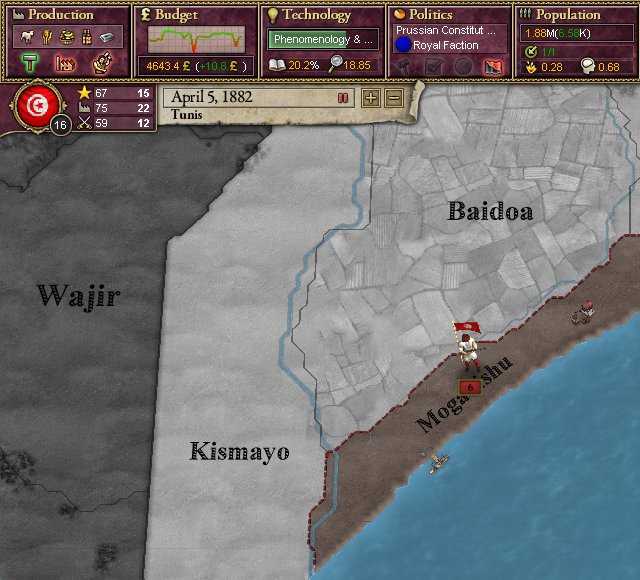
And that was to be Sadok Bey’s legacy, since in 27 October 1882 he abdicated in favour of his heir, Ali III Bey ibn al-Husayn (Ali Bey), having grown tired of the weight of leadership. He had modernized the nation and led it in three wars of conquest, while keeping it within French protection. And although Tunisian industry was not yet competitive internationally, it too could be counted among Sadok Bey’s many accomplishments.
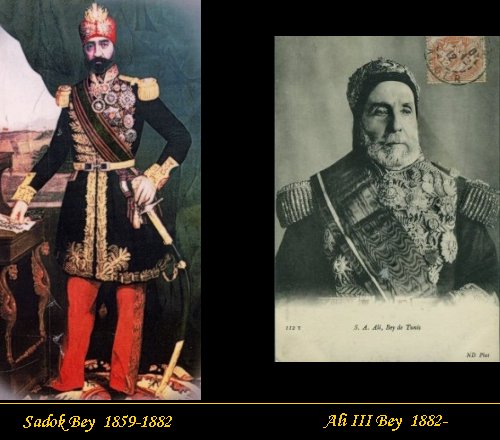
-------
Historical note: The real Sadok Bey abdicated in 1882 after Tunisia was made a French protectorate. The country has had a far better run in this story.
Tunis arrived late at the industrialized world, and it would struggle to find a competitive niche in the world market. Until then, cement and glass factories were initiated in all three states by the government, since the conservative Royal Faction had been voted to power in 1869, and it espoused the economic doctrine of State Capitalism.

However, even they seemed to have trouble getting started. The glass factory was being constructed with little difficulty but would still not become operational for another year, but the cement factories required timber and that was in short supply in the world market. To deal with the rising number of jobless craftsmen, trinket subsidies and trinket pensions were enacted in 1871

Militancy went down nation-wide, and would not grow again as easily as in the years before. As Tunis’ diplomatic status, as a civilized associate of France, grew, Switzerland and the Papal States offered alliances, which the Tunisian government accepted. There was still some ill feeling against Rome, but a war within France’s SOI was out of the question and closer relations with the Pope would allow Tunis better information on the affairs of Italy and perhaps a chance to meddle in them, eventually.

As the year went by and the world timber shortage continued unabated, the Tunisian government sought unconventional ways to get access to that resource. It was at that point that it was suggested in parliament that since Tunis was now counted as a civilized nation, it would befit it to act as one. Brunei had much unexploited timber and little in the way of defence. Though its distance would have made any thought of establishing a protectorate there illogical in the past, France had recently agreed to offer Tunis military access, so the former’s many ports in the Indian Ocean would make the endeavour possible.
So it was that in November 1872, a small fleet carrying an expeditionary force of two brigades arrived off the coast of Brunei, and a declaration of war was delivered.

Resistance was meek, and after just over a year, in January 1874, Tunisian Brunei was formed.

Though that expedition appealed to the Tunisian people’s sense of jingoism and national pride, it had no noticeable effect on Tunis’ industry, so it was technically a strategic failure. Long exposure to the Far East also introduced a new strain of flu to Tunisia, which claimed many lives before it was contained.

Some timber finally appeared in the market in 1877, and the cement factories began to be constructed. The glass factories in Tunis, though initially profitable, started losing money fast after much had been invested in expanding them. Likewise with a steel factory in Constantine, while an explosives factory in Crete was never profitable to begin with. Local capitalists initiated some new construction projects, but the outlook on their sustainability was not good.

To keep the economy from imploding under the large industrial subsidies needed to keep the factories running, and also to avoid the complete ruin of Tunisian industry, a micromanaging policy of intermittent subsidies was enforced. Any factory costing close to 10 pounds per day or more would receive no funding from the state, until it had cut down on costs and laid off some workers. When it then struggled to stay afloat, it would receive subsidies again. That policy kept the country’s industry running while avoiding bankruptcy, but at the cost of increased job anxiety among the population and increased workload for the government.
Still, the nation moved on, and Darwinism was made popular in 1878, boosting the educational system significantly.

A year after that the Papal Stated agreed to give Tunis military access, while a year after that the United Kingdom hosted the Congo Conference. Tunis would have very much liked to attend, but it was still a poor country and could not afford the cost.

To make up for it, the Brunei Expeditionary Army was sent to Mogadishu, to wrest the town away from Oman. After pacifying the town, the army landed in Oman proper in December and made for its capital, so by April 1881 the Omanis had decided that further resistance was counter-productive and parted with their last African holding.

The new colony immediately experienced an influx of immigrants, which placed an extreme strain on its infrastructure. So it came as no big surprise when an outbreak of tuberculosis afflicted the population after just a few months.

In 1882, Tunis’ increasing prestige and industry placed it among the secondary powers of the world. It may not have been a rich secondary power, but it had earned that position through blood and sweat.

And that was to be Sadok Bey’s legacy, since in 27 October 1882 he abdicated in favour of his heir, Ali III Bey ibn al-Husayn (Ali Bey), having grown tired of the weight of leadership. He had modernized the nation and led it in three wars of conquest, while keeping it within French protection. And although Tunisian industry was not yet competitive internationally, it too could be counted among Sadok Bey’s many accomplishments.

-------
Historical note: The real Sadok Bey abdicated in 1882 after Tunisia was made a French protectorate. The country has had a far better run in this story.
Tunisian Brunei, I love it!
Bummer about the timber problems, I would have thought getting Brunei would solve that for sure. Odd.
Double-bummer about the unprofitable factories. What is your railroad level there? Maybe the infrastructure is too low?
Bummer about the timber problems, I would have thought getting Brunei would solve that for sure. Odd.
Double-bummer about the unprofitable factories. What is your railroad level there? Maybe the infrastructure is too low?
It is rather low, I'm afraid. Level 1. And for some odd reason Brunei doesn't attract any immigrants (in contrast, I got 120,000 people flocking to Mogadishu the day I conquered it), so I'm thinking of making it a satellite to recoup some of my infamy at some point. I'm confident that fuel refineries will save me, so long as 'cracking' fires up reasonably soon after I discover organic chemistry. When I start making money again, I should be able to pursue the dream of a new Carthaginian Empire in the Mediterranean with more confidence.
Tunisian Brunei, I love it!
Bummer about the timber problems, I would have thought getting Brunei would solve that for sure. Odd.
Double-bummer about the unprofitable factories. What is your railroad level there? Maybe the infrastructure is too low?
China is probably eating all the timber. Westernising CHina does scary things to the world economy.
- 1
I guess the naughty French were eating up all your timber. Awfully mean of them. Been in a sphere can be extremely annoying at times. A nice hearty industry score build up at some constant expense. Secondary power is definitely something to be proud of. Surprising to me to see a steel industry losing money, my USA game had a few really high level ones making impressive profits. Maybe demand will build up a bit more soon. Is Somalia going to be easy to turn into a state with that huge influx of maghrebi? Would you turn it into a state even if you could? Anyway nice progress... good luck on your journey into the 20th century.
Edit: Are you finding it hard to get coal for your steel factory is that the problem?
Edit: Are you finding it hard to get coal for your steel factory is that the problem?
I never thought I'd see a Tunisian colony, that's for sure, let alone two. It's funny how timber always seems to be in short supply. I wonder if that's a bug in the game? Anyway, great job!
Tunisian Brunei?! Who ever thought they'd see that? Or Tunisia as a Secondary power for that matter.
I'm sad you didn't at least try to get Tunisian Congo, where are you planning on expanding to next?
I'm sad you didn't at least try to get Tunisian Congo, where are you planning on expanding to next?
I'd have gone about 7,000 in debt if I had attended the Congo Conference, and that would be money I couldn't make back for many years, if not decades, at this rate. It does look like France is eating up all my timber, and also my fruit, fish and wool (I think, or some other basic life resource), since my POPs can't get any and are permanently in yellow. But there's a worldwide shortage of timber and, although China may well be the culprit, it seems to happen at around this time in all my games since 1.2. Finding coal is also a problem, but everything is compounded by low infrastructure and low level commercial and industrial techs. Still, in a decade from now things should begin to look up, maybe sooner if I can get 'cracking' soon.
For my next expansions, until I become capable of colonizing, I'll try to conduct them in the Med, either in the East, to liberate the Phoenician homeland of Lebanon from the Egyptians or to 'liberate' Tripoli from the Ottomans (if they ever lose their full house of GP allies...) or in the West, if Spain or Two Sicilies show any weaknesses I can exploit, for the glory of the New Carthaginian Empire.
For my next expansions, until I become capable of colonizing, I'll try to conduct them in the Med, either in the East, to liberate the Phoenician homeland of Lebanon from the Egyptians or to 'liberate' Tripoli from the Ottomans (if they ever lose their full house of GP allies...) or in the West, if Spain or Two Sicilies show any weaknesses I can exploit, for the glory of the New Carthaginian Empire.
Tunisian Brunei - excellent!
I think all the new timber went straight into the pockets of your greedy French overlords. Too bad.
Could the lack of migration to Brunei have something to do with Maghrebi being a non-emigrating culture? Or is that flag waived for internal migrtaion? Not sure. The distance might be a factor, as well.
I think all the new timber went straight into the pockets of your greedy French overlords. Too bad.
Could the lack of migration to Brunei have something to do with Maghrebi being a non-emigrating culture? Or is that flag waived for internal migrtaion? Not sure. The distance might be a factor, as well.
I'm back!
Distance might be a factor, or the fact that the native Bruneians have a higher literacy rating than my people, or simply its location. Maghrebis had no trouble migrating en masse to Mogadishu.
Distance might be a factor, or the fact that the native Bruneians have a higher literacy rating than my people, or simply its location. Maghrebis had no trouble migrating en masse to Mogadishu.
Chapter VIII – Upheaval in the Mediterranean
The new Bey assumed his duties at a crucial time for Tunis. The nation had attained a temporary position of respect among the secondary powers of the world, but it still faced structural problems and uncertainty in its international relations. French influence protected the country from invasions but at great cost to the people’s prosperity, since even basic goods soon became scarce on the markets, they being shipped off for consumption in France. Industry faced similar resource shortages, and also suffered from primitive infrastructure and a weak middle class.
That’s why the government pushed even harder its ideology of ‘Neo-Carthaginianism’, in part to take the people’s mind off their more pressing problems and in part to pursue non-peaceful solutions to them. As in the past, Italy was considered a potential threat, and it was considered imperative that it would remain disunited. So it was with some alarm that news came of Garibaldi’s redshirts running amok in Lucca and Tuscany, both in the Austrian sphere of influence but both far enough from Austria to not receive any direct support. Tunis had already received military access from the Papal States, and a grave decision was reached, after much deliberations: Tunis would invade both Lucca and Tuscany to make sure the Redshirts would not take over. When the declarations of war were delivered in October, Austria intervened to protect Lucca but not Tuscany. Soon, Tunisian armies were engaging the Italian nationalists in both countries.
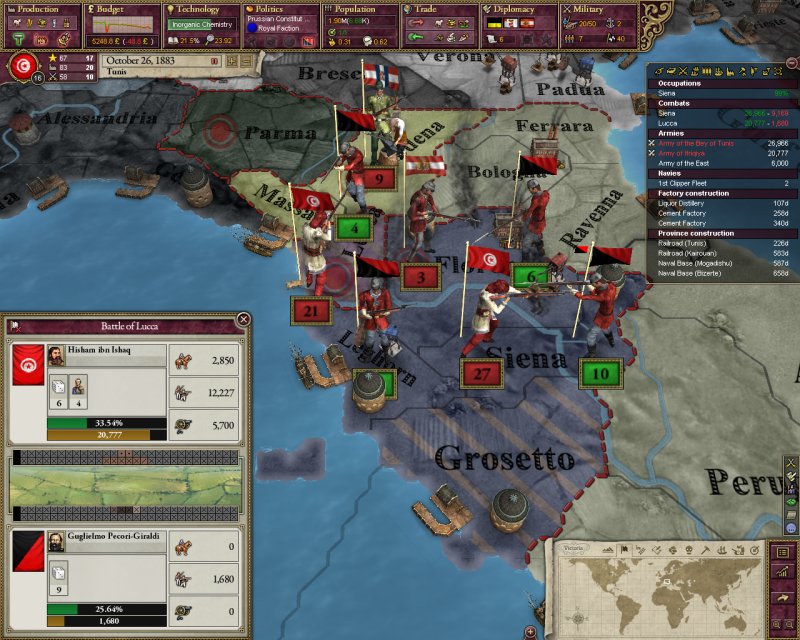
In March 1884, small bands of Tunisian anarcho-liberals decided the time was ripe for armed struggle, and rose up in Mogadishu, Kairouan and Iraklion. It was the first time rebels had taken action in modern Tunisian history, and would not be the last.
In September, Tuscany, having been rid of its rebels, agreed to Tunis’ peace terms (some small measure of humiliation, which added some prestige to Tunis).
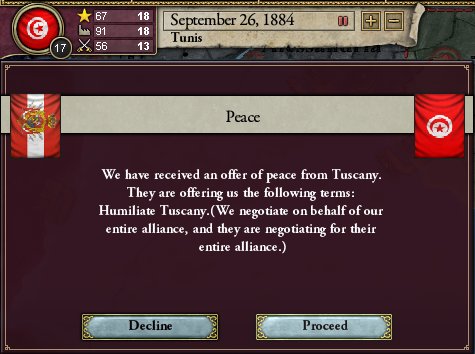
In early October, in the face of an Austrian invasion of Tunis, a white peace was negotiated, ending all operations in Lucca, which had attained their primary objective.
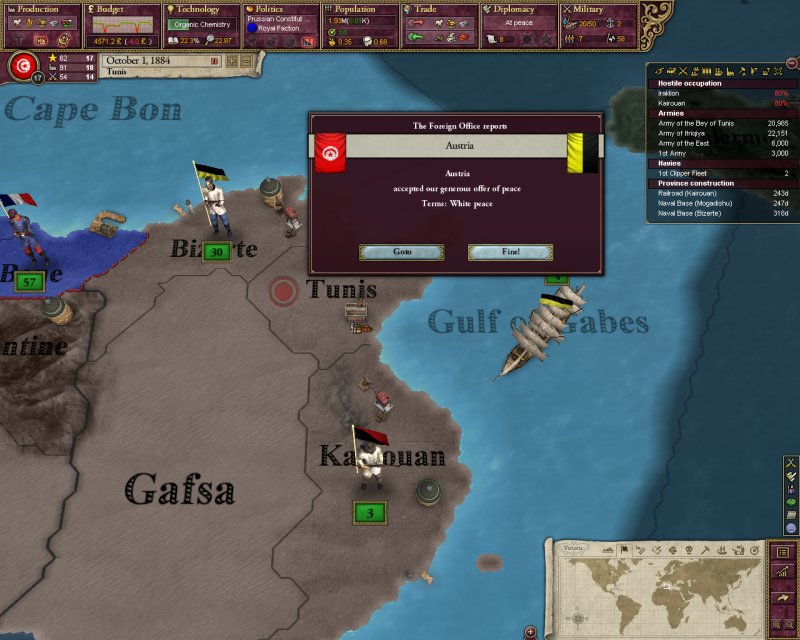
Tunis emerged from those two wars with a net loss of prestige, but Italian unification had been averted, at least for the immediate future.
In 1885, oil was found in Brunei. Suddenly, its conquest seemed more fortunate than it had until recently to the Tunisian government. Research in organic chemistry was proceeding steadily, and it was hoped that new uses would soon be discovered for that resource.
But, organic chemistry aside, the colonial race was the focus of Tunisian research. The nation had recently dropped out of secondary power status, a mere temporary setback, as the government would assure the worried Bey, while France was colonizing south of Algeria and Sardinia-Piedmont had been given the Congo. Austria was also making some progress in Western Sahara, and it had little reason to like Tunis, after recent events.
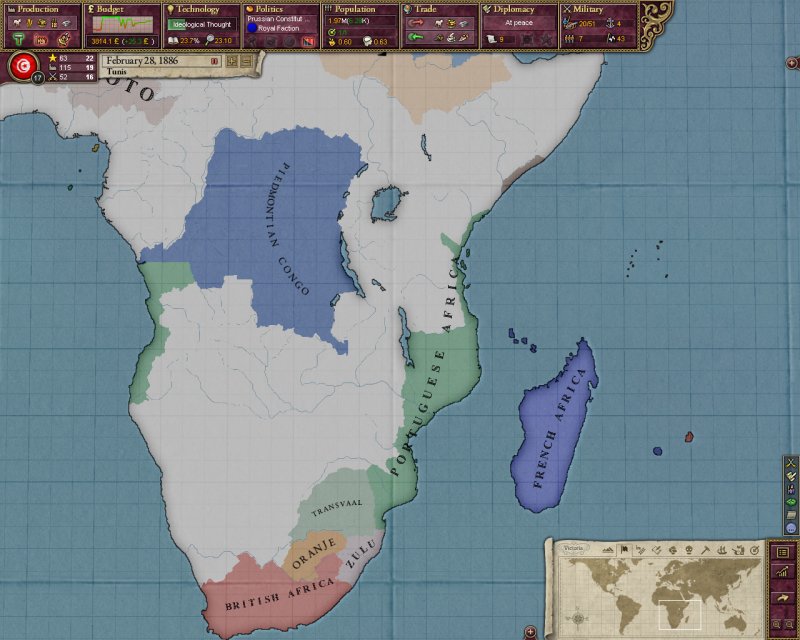
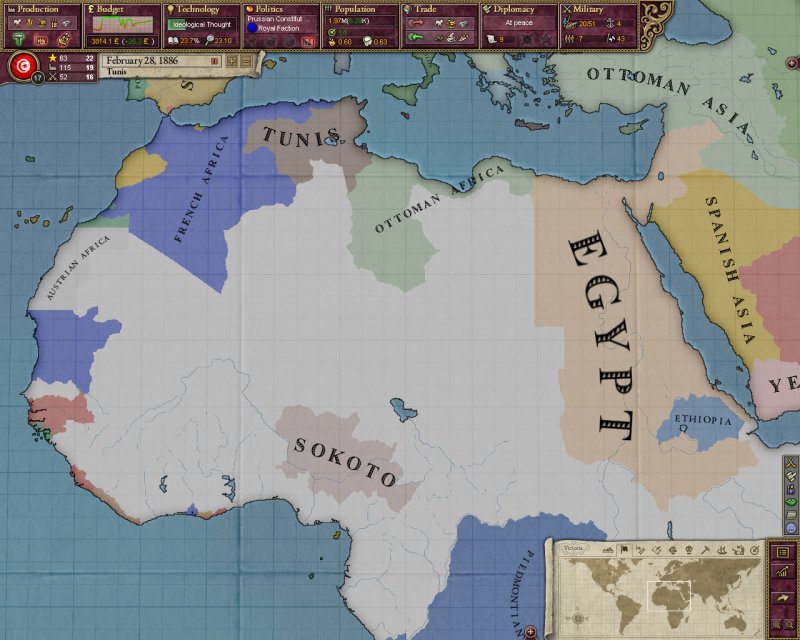
A chance for action came in 1886, when the Spanish government, which had previously ceded much of its Moroccan territory to France and had lost control of Catalonia, was toppled by anarcho-liberals. The new, radical, government immediately declared war on Catalonia, bringing down upon it the wrath of France, which started a separate war to claim the rest of Spanish Morocco.
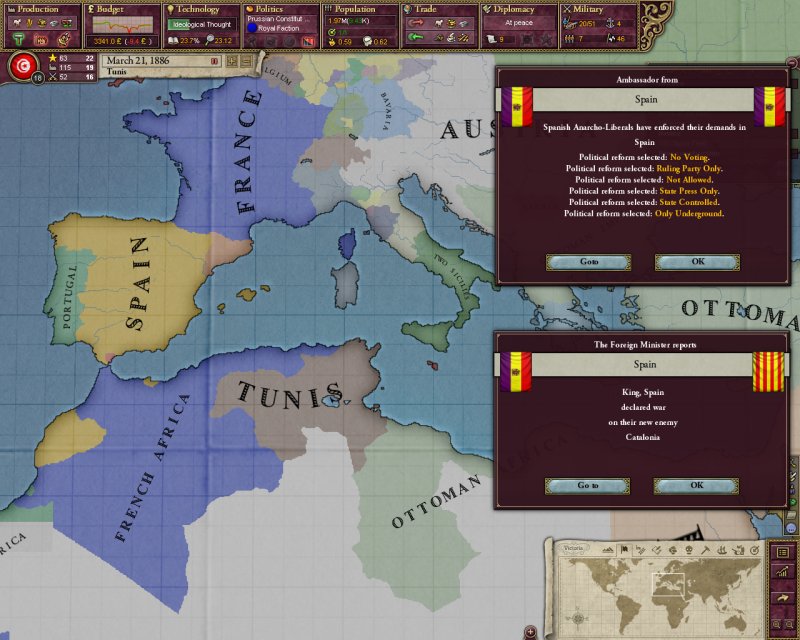
Seeing Spain crumble thus, under blockade by the French navy and under invasion from French troops, the Tunisian government joined in, and demanded the Balearic Isles, claiming some ancient Carthaginian entitlement to them. The world was not convinced, but also did nothing to stop Tunis.
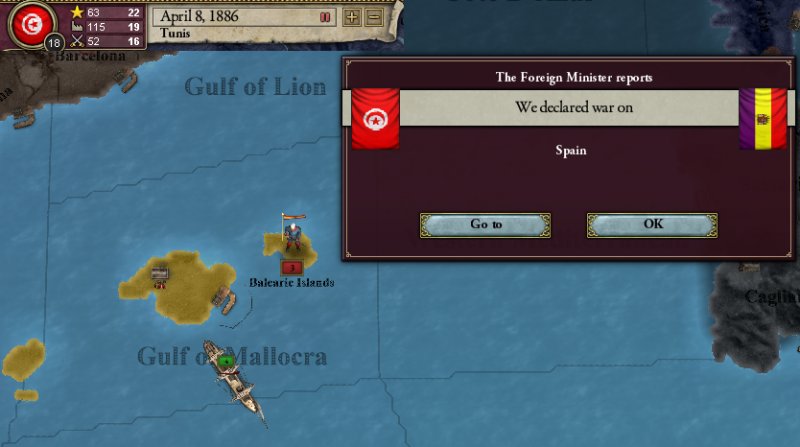
The islands’ garrisons were quickly subdued, and the rest of the Tunisian army was ferried to France, from where they were to invade the Spanish mainland. While French troops marched forward in Spain and West Africa, Spanish forces were overrunning Catalonia, and some were moving into France. It was there that the first real battle of the Spanish-Tunisian war was fought.
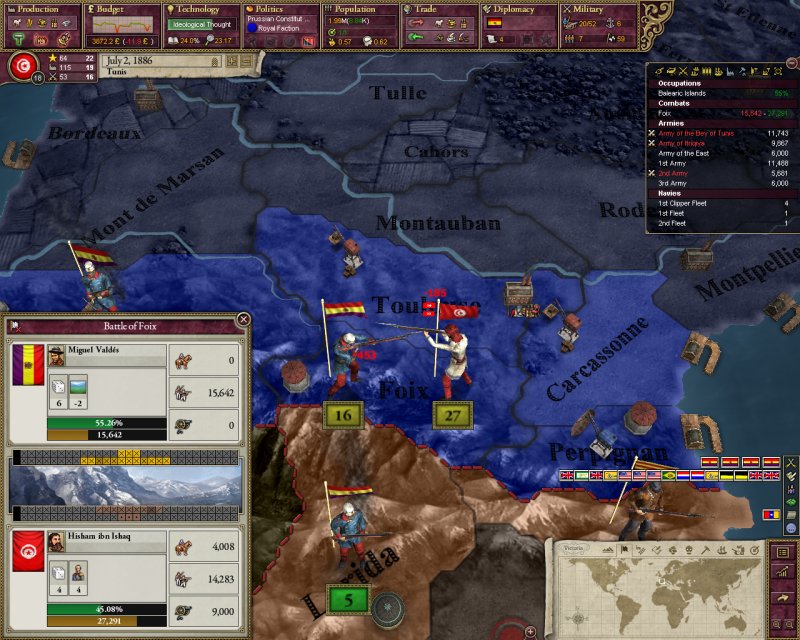
Good defensive positions in the mountains kept the Spanish brigades at bay, while a military access treaty was being negotiated with Catalonia.
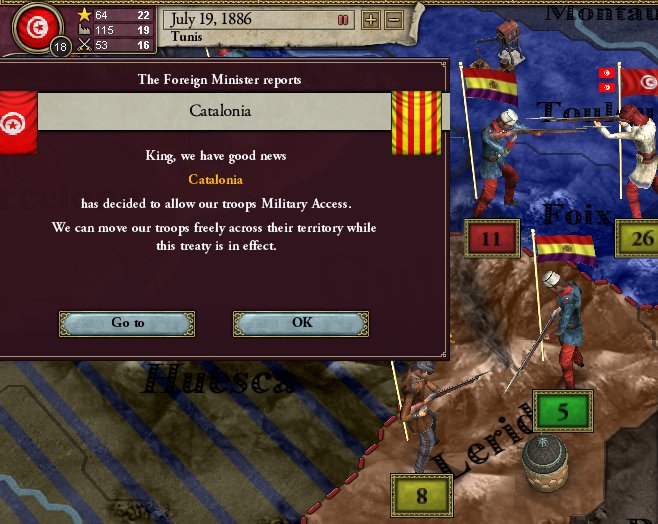
The Battle of Foix was a resounding victory, and the rest of the summer was spent mopping up Spanish troops in France before moving into Catalonia
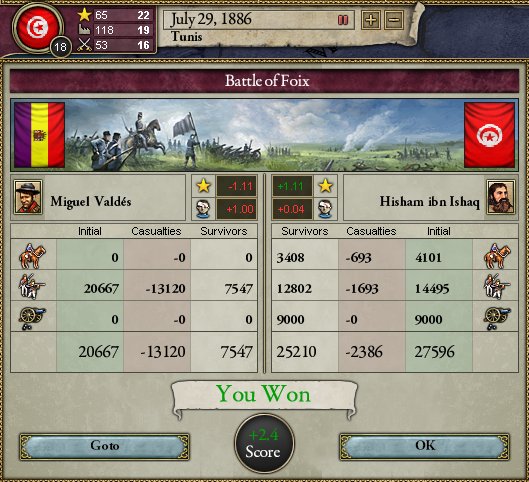
In September, tasting blood in the water, Portugal declared war on Spain, claiming Extremadura. The Netherlands came to the Portuguese’ assistance.
Meanwhile, Tunisian forces had been marching quickly through Catalonia and linked up with the French front, where the last great battle was being fought in Teruel. Tunisian troops reinforced the French positions and also moved to block the Spanish lines of retreat.
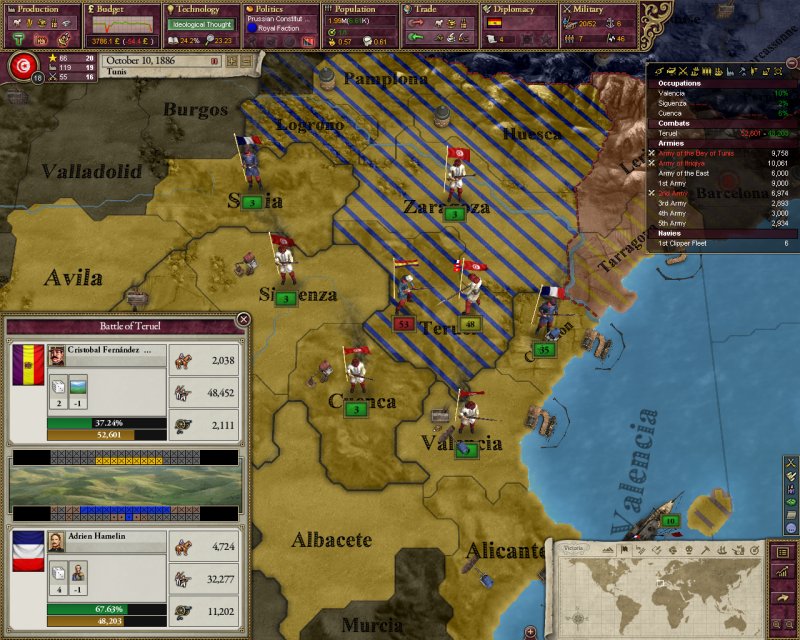
The Spanish defeat, with over 70,000 men killed or captured, effectively ended their military resistance in Spain.
One month later, Spain made peace with France, acquiescing to its demands. Less than three weeks after that, France declared war on Prussia, claiming the Rheinland. Victory seemed to have made it optimistic, though some would call that attitude arrogance. In any case, Prussia had been much weakened by Austria in recent wars but it could still call upon a large number of allies, so its defeat was far from certain.
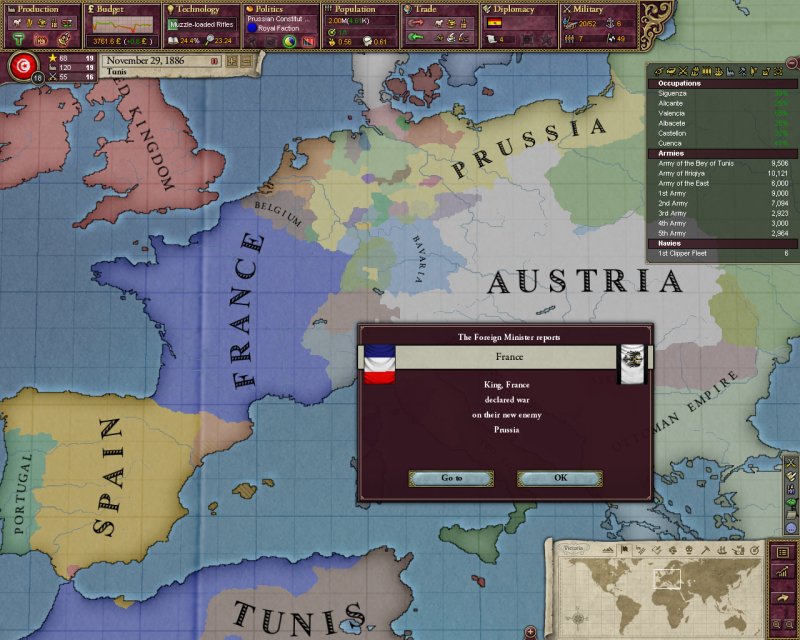
For the next year, Tunisian troops occupied much of Spain unopposed, until the Spanish agreed to accept the loss of the Balearic Isles. The Catalonian conscript army was still campaigning in Spain, but without opposition it was expected that the Catalonians would soon obtain a favourable peace. Tunis entered in an alliance with them, to strengthen their legitimacy and weaken the Spanish case.
In March 1888 the Portuguese-Dutch alliance ended their war, after Spain agreed to cede Cuba to the Netherlands. (The USA was, at the same time, up against a Russian-Mexican alliance, that would soon see the return of Alaska to Russia).
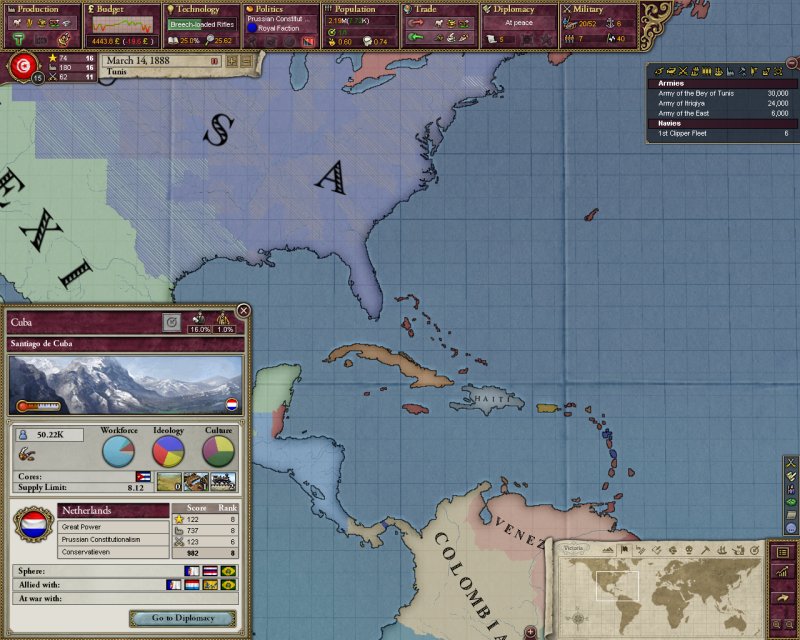
Spain, once a great power, was now 12th in the world rankings, while Tunis was 15th. However, the latter’s economic problems were unresolved and, taking advantage of Lucca’s truce with Tunis, Garibaldi’s Redshirts returned and succeeded in convincing Sardinia-Piedmont to form the nation of Italy. By July 1888 the map of Europe had been redrawn and, with France still fighting the Prussians and their allies, more changes seemed imminent.
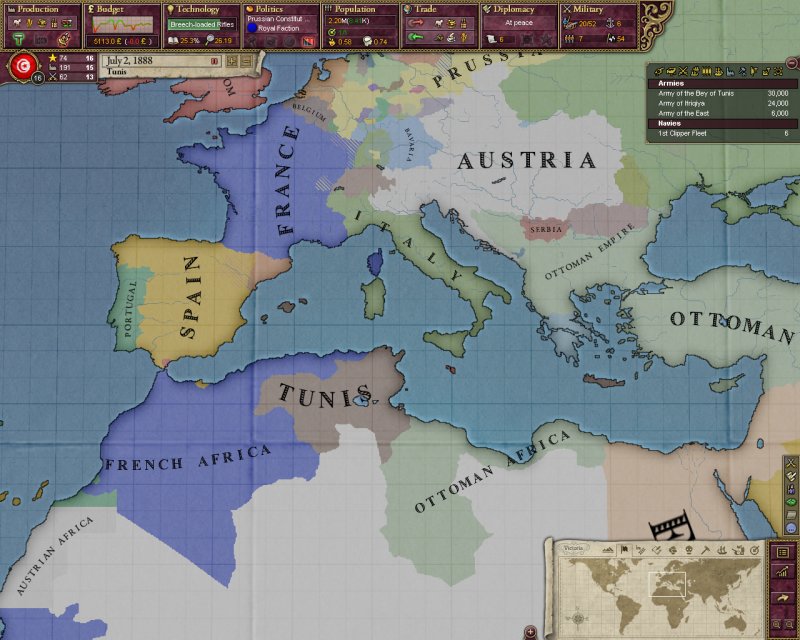
The new Bey assumed his duties at a crucial time for Tunis. The nation had attained a temporary position of respect among the secondary powers of the world, but it still faced structural problems and uncertainty in its international relations. French influence protected the country from invasions but at great cost to the people’s prosperity, since even basic goods soon became scarce on the markets, they being shipped off for consumption in France. Industry faced similar resource shortages, and also suffered from primitive infrastructure and a weak middle class.
That’s why the government pushed even harder its ideology of ‘Neo-Carthaginianism’, in part to take the people’s mind off their more pressing problems and in part to pursue non-peaceful solutions to them. As in the past, Italy was considered a potential threat, and it was considered imperative that it would remain disunited. So it was with some alarm that news came of Garibaldi’s redshirts running amok in Lucca and Tuscany, both in the Austrian sphere of influence but both far enough from Austria to not receive any direct support. Tunis had already received military access from the Papal States, and a grave decision was reached, after much deliberations: Tunis would invade both Lucca and Tuscany to make sure the Redshirts would not take over. When the declarations of war were delivered in October, Austria intervened to protect Lucca but not Tuscany. Soon, Tunisian armies were engaging the Italian nationalists in both countries.

In March 1884, small bands of Tunisian anarcho-liberals decided the time was ripe for armed struggle, and rose up in Mogadishu, Kairouan and Iraklion. It was the first time rebels had taken action in modern Tunisian history, and would not be the last.
In September, Tuscany, having been rid of its rebels, agreed to Tunis’ peace terms (some small measure of humiliation, which added some prestige to Tunis).

In early October, in the face of an Austrian invasion of Tunis, a white peace was negotiated, ending all operations in Lucca, which had attained their primary objective.

Tunis emerged from those two wars with a net loss of prestige, but Italian unification had been averted, at least for the immediate future.
In 1885, oil was found in Brunei. Suddenly, its conquest seemed more fortunate than it had until recently to the Tunisian government. Research in organic chemistry was proceeding steadily, and it was hoped that new uses would soon be discovered for that resource.
But, organic chemistry aside, the colonial race was the focus of Tunisian research. The nation had recently dropped out of secondary power status, a mere temporary setback, as the government would assure the worried Bey, while France was colonizing south of Algeria and Sardinia-Piedmont had been given the Congo. Austria was also making some progress in Western Sahara, and it had little reason to like Tunis, after recent events.


A chance for action came in 1886, when the Spanish government, which had previously ceded much of its Moroccan territory to France and had lost control of Catalonia, was toppled by anarcho-liberals. The new, radical, government immediately declared war on Catalonia, bringing down upon it the wrath of France, which started a separate war to claim the rest of Spanish Morocco.

Seeing Spain crumble thus, under blockade by the French navy and under invasion from French troops, the Tunisian government joined in, and demanded the Balearic Isles, claiming some ancient Carthaginian entitlement to them. The world was not convinced, but also did nothing to stop Tunis.

The islands’ garrisons were quickly subdued, and the rest of the Tunisian army was ferried to France, from where they were to invade the Spanish mainland. While French troops marched forward in Spain and West Africa, Spanish forces were overrunning Catalonia, and some were moving into France. It was there that the first real battle of the Spanish-Tunisian war was fought.

Good defensive positions in the mountains kept the Spanish brigades at bay, while a military access treaty was being negotiated with Catalonia.

The Battle of Foix was a resounding victory, and the rest of the summer was spent mopping up Spanish troops in France before moving into Catalonia

In September, tasting blood in the water, Portugal declared war on Spain, claiming Extremadura. The Netherlands came to the Portuguese’ assistance.
Meanwhile, Tunisian forces had been marching quickly through Catalonia and linked up with the French front, where the last great battle was being fought in Teruel. Tunisian troops reinforced the French positions and also moved to block the Spanish lines of retreat.

The Spanish defeat, with over 70,000 men killed or captured, effectively ended their military resistance in Spain.
One month later, Spain made peace with France, acquiescing to its demands. Less than three weeks after that, France declared war on Prussia, claiming the Rheinland. Victory seemed to have made it optimistic, though some would call that attitude arrogance. In any case, Prussia had been much weakened by Austria in recent wars but it could still call upon a large number of allies, so its defeat was far from certain.

For the next year, Tunisian troops occupied much of Spain unopposed, until the Spanish agreed to accept the loss of the Balearic Isles. The Catalonian conscript army was still campaigning in Spain, but without opposition it was expected that the Catalonians would soon obtain a favourable peace. Tunis entered in an alliance with them, to strengthen their legitimacy and weaken the Spanish case.
In March 1888 the Portuguese-Dutch alliance ended their war, after Spain agreed to cede Cuba to the Netherlands. (The USA was, at the same time, up against a Russian-Mexican alliance, that would soon see the return of Alaska to Russia).

Spain, once a great power, was now 12th in the world rankings, while Tunis was 15th. However, the latter’s economic problems were unresolved and, taking advantage of Lucca’s truce with Tunis, Garibaldi’s Redshirts returned and succeeded in convincing Sardinia-Piedmont to form the nation of Italy. By July 1888 the map of Europe had been redrawn and, with France still fighting the Prussians and their allies, more changes seemed imminent.

Last edited:
Take Tripoli from the Ottomans! They surely have a military even more laughable than yours.

